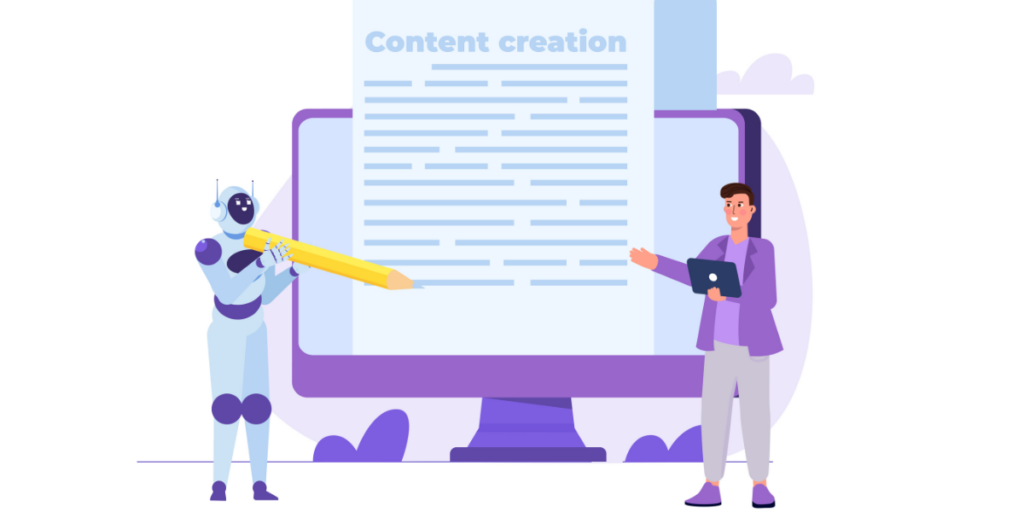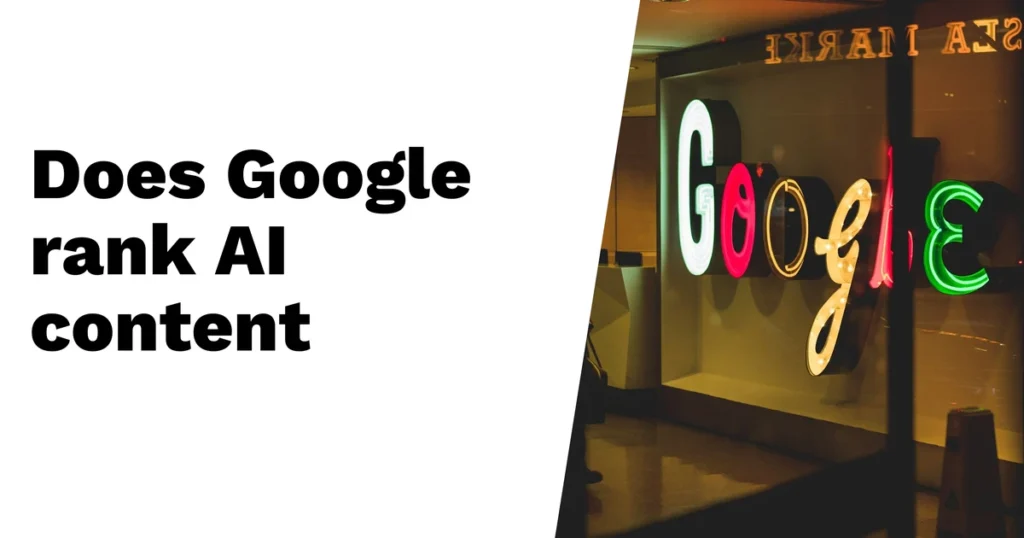Google’s approach to AI-generated content is not about penalizing it just because it’s made by machines. The main point is that the content needs to meet Google’s quality standards. It should add value for users, answering their questions and being informative. Google checks this through E-E-A-T guidelines.
Regular algorithm updates focus on ranking high-quality, relevant content better, whether human or AI-written. Also, original and unique content avoids duplication penalties. Engaging posts encourage user interaction and can improve rankings as well; transparency about using AI boosts trust with readers too.
What is Google’s E-E-A-T framework?
EEAT stands for Experience, Expertise, Authoritativeness, and Trustworthiness. It is a concept from Google’s Search Quality Rater Guidelines that helps determine the credibility of a webpage. Experience refers to the firsthand knowledge or real-world experience of the content creator. Expertise measures the depth of knowledge a person has in a specific subject, which is particularly important for YMYL (Your Money, Your Life) topics such as health and finance. Authoritativeness relates to the reputation of the website and the author within their industry, while trustworthiness ensures the reliability and accuracy of the content, making sure it is safe and factual.
What is Google’s Search Quality Rater Guidelines (SQRG)?
Google’s Search Quality Rater Guidelines (SQRG) is a handbook used by Quality Raters, who are human reviewers employed by Google to assess search results. Their evaluations help Google refine its algorithms and improve how search rankings work. These guidelines focus on evaluating EEAT, assessing Page Quality (PQ) and Needs Met (NM) ratings, and identifying YMYL topics that require higher trustworthiness. They also emphasize understanding the intent behind search queries to ensure that users get relevant and high-quality results.
While Quality Raters do not directly influence rankings, their feedback helps Google improve its algorithms to prioritize high-quality, trustworthy content in search results.
Google’s Stance on AI-Generated Content

Google evaluates content based on E-E-A-T guidelines, and if AI-generated content aligns with these principles, it can rank favorably in search results. Furthermore, Google frequently updates its algorithms to enhance the quality of search outcomes.
Recent updates focus on ensuring that high-quality, relevant content ranks above all else, regardless of whether it was written by humans or machines. For example, the March 2025 Core Update emphasizes content relevance and user satisfaction. Additionally, AI-generated content must be original and unique; any duplicate or low-quality material could hurt rankings.
Google uses advanced algorithms to detect duplicate content and may lower its visibility in search results. Ultimately, engaging content that keeps users interacting through comments, shares, or prolonged visits tends to rank better organically. Transparency about how content is created can also foster trust, making it clear when AI is involved. Ethical considerations are crucial too; misleading or false information should never be generated, as maintaining credibility and trust with users is vital.
Deciding factors in ranking content on Google
Importance of content relevance
Google consistently updates its algorithms to prioritize quality content that satisfies user needs. For instance, the March 2025 Core Update continues to refine how relevance and user satisfaction are measured, ensuring that well-crafted AI content can compete effectively with human-generated work. If the content is relevant to a user’s search query, they are more likely to stay on the website. This will not only benefit your SERP rankings but also improve your overall SEO score.
Importance of Originality and Uniqueness
Another critical aspect is originality. AI-generated content should be unique and free from plagiarism. Google’s algorithms are adept at identifying duplicate or low-quality material, which can hinder rankings. Original content is usually considered to be of high quality and hence has a positive impact on your rankings.
AI-generated content that closely resembles existing material can be flagged as duplicate content, which Google does not favor. For instance, if an AI tool produces an article that mirrors another source too closely, it risks being devalued in search results. Google’s algorithms are designed to detect such issues, prioritizing original work that adds new insights or perspectives.
Moreover, content quality is crucial. Google assesses content based on its originality and the value it offers to users. If AI-generated content provides fresh information or a new angle on a topic, it stands a better chance of ranking well. This is why creating unique, informative content should be a priority, whether the writing is done by a human or an AI.
Some important content quality parameters:
- Consistency in tone and voice
- Comprehensive coverage of topics
- Proper grammar and punctuation
- Use of relevant keywords
- Adaptation to audience preferences
- Inclusion of supporting data and references
- Avoidance of duplication or plagiarism
Impact of Algorithm Updates on AI Content
As mentioned before, Google’s frequent algorithm updates aim to improve the quality of search results and don’t differentiate even if the content is written by an AI. Instead, they prioritize high-quality information, regardless of the author. For instance, the March 2025 Core Update emphasized improving content relevance. This proves that Google rewards you for your content quality even if it is written by an AI content writer and penalizes you for duplication or plagiarism.
| Update Name | Focus | Impact on AI Content |
|---|---|---|
| March 2025 Core Update | Improving content relevance and user satisfaction | Continues to favor high-quality, relevant content, whether created by AI or humans |
| June 2023 Core Update | Prioritizing expert content in sensitive topics | Encouraged AI content to meet higher standards of E-E-A-T |
| December 2022 Helpful Content Update | Focusing on content created for people rather than search engines | Boosted user-centered content, impacting AI-generated content positively if it aligns with user intent |
Transparency and Disclosure in Content Creation
Transparency about content creation is essential for building trust with your audience. When AI is used to generate content, disclosing this fact can enhance the perceived authoritativeness of the material. For instance, if a blog post states that it was created with the assistance of AI, readers may appreciate the honesty and understand the context behind the content.
Google values clarity regarding sources and authorship. This means that content that openly communicates its origins, whether written by a human or generated by AI, resonates better with users. When users feel informed, they are more likely to engage with the content, which in turn positively impacts its search ranking. Moreover, ethical considerations play a role here; marketers should never use AI to mislead or provide false information. Maintaining credibility by being upfront about how content is created helps foster a trustworthy relationship with the audience. Bringing us to the next point.
Ethical Considerations in AI Content Generation
Ethical considerations are crucial when using AI to generate content, as there is no guarantee of how much accurate information is being provided by AI. It is the duty of Marketers and content creators to ensure that AI does not produce misleading or false information. For instance, using AI to generate fake news or deceptive articles can erode trust and damage a brand’s reputation. It’s important to maintain credibility by providing accurate and honest information.
Additionally, transparency about the use of AI in content creation can foster trust with audiences. If readers know that AI has been used, they may be more understanding of the content’s context. Ethical content practices also include proper attribution of sources and ensuring that AI-generated content does not infringe on copyrights. By adhering to these ethical standards, creators can build a more trustworthy relationship with their audience.
Frequently Asked Questions
1. Can Google tell if content is written by AI?
Yes, Google can analyze content and determine if it’s generated by AI, but it focuses more on content quality and relevance than on the writing source.
2. Does using AI-written content affect my SEO ranking?
If the AI content is original, useful, and aligns with user intent, it can rank well in SEO. However, low-quality or duplicate content may hurt your ranking.
3. What does Google look for in content, whether written by AI or humans?
Google looks for quality, relevance, unique information, proper formatting, and good user experience when ranking content.
4. Can AI content be optimized for better SEO?
Yes, AI content can be optimized by incorporating keywords, improving readability, and ensuring it answers user questions effectively.
5. Should I trust AI to create all my content?
While AI can help generate ideas and drafts, human oversight is important to ensure the content is accurate, engaging, and aligns with your brand voice.
TL;DR Google does not penalize AI-generated content as long as it meets quality and relevance standards. E-E-A-T (Experience, Expertise, Authoritativeness, Trustworthiness) is crucial for ranking. Algorithm updates focus on content quality, and originality is key to avoiding penalties. User engagement impacts rankings positively, while transparency about AI usage can build trust. Ethical considerations are vital to maintaining credibility in content creation.




